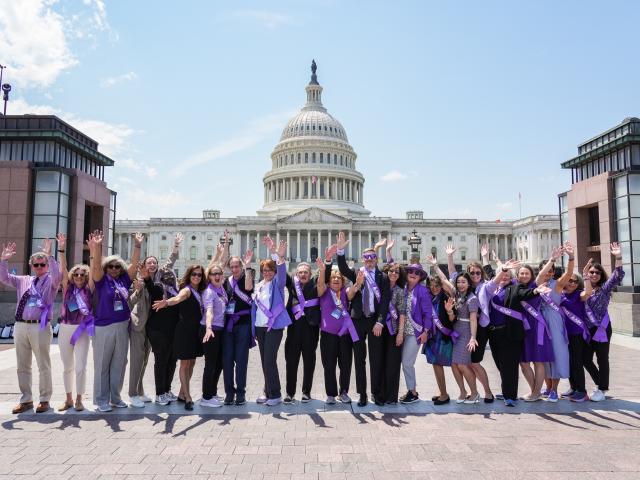Senate appropriators from both sides of the aisle raise warnings of harm that would come from proposed research funding and staff cuts
Washington, D.C., April 30, 2025 — During today’s Senate Appropriations Committee hearing on biomedical research, the Alzheimer’s Association was pleased to hear strong bipartisan support for our nation’s continued commitment to Alzheimer’s and other dementia research. Senators from both parties echoed the Association’s call for continued progress and voiced serious concerns about the significant harm proposed cuts to biomedical research would have on public health and scientific advancement.
“Bipartisan Senate appropriators are united in their commitment to biomedical research and ending Alzheimer’s and other dementia,” said Joanne Pike, DrPH, president and CEO of the Alzheimer’s Association and CEO of the Alzheimer’s Impact Movement (AIM). “For the first time in history, the number of Americans living with Alzheimer’s has surpassed 7 million, and nearly 12 million are providing unpaid care. Our country must stay focused on accelerating scientific progress on diagnosis, prevention, treatments, and eventually cures.”
Committee members and testifying researchers discussed the importance of biomedical research and retaining America’s leadership on scientific innovation. Throughout the hearing, both Democratic and Republican senators took the time to underscore their support for Alzheimer’s and dementia research specifically and urged the importance of building on our nation’s progress against this devastating disease.
“Because of studies financed by the National Institute on Aging, researchers now have an array of biomarker tests for dementia, including a new blood test, allowing for earlier diagnosis of this devastating disease,” said Senate Appropriations Committee Chair Susan Collins (R-Maine). “But the continued success of this system and America’s leadership cannot be taken for granted….Proposed cuts, the firing of federal scientists, and policy uncertainties threaten to undermine the foundation of our nation’s global leadership.”
“NIH has an incredibly high return on investment. While medical research accounts for 1% of the federal budget, NIH has contributed [to] over 99% of drugs approved by the FDA in recent years,” said Vice Chair Patty Murray (D-Wash.). Sen. Murray emphasized her concern about cuts to biomedical research by saying, “Why on earth would we give up on Alzheimer’s research or heart disease or cancer?”
Throughout the hearing, senators and researchers discussed the long-term impact of proposed cuts to biomedical research, including discouraging young researchers from entering the field, maintaining food and drug safety, losing global biomedical leadership to other countries, and most importantly, delaying new treatments or preventing their discovery entirely.
“Impactful biomedical research that lessens the burden of disease does not only take a village, it takes a country,” said Barry Paul Sleckman, M.D., Ph.D., University of Alabama at Birmingham, who testified at today’s hearing. “Until recently, this country has been undeniably the United States. For generations, the U.S. has had an unwavering commitment to biomedical research, training the next generation of scientists and accelerating the pace of disease-curing discoveries.”
“The funding choices our elected leaders make today will have a profound impact on the Alzheimer’s and dementia community for years to come,” said Pike. “Thank you to Appropriations Chair Susan Collins, Vice Chair Patty Murray, and all of our bipartisan congressional champions for your ongoing commitment to the fight against Alzheimer’s and other dementia.”
The Alzheimer’s Association and AIM share the concerns of these and other congressional champions. Read the Association and AIM’s past statements on the importance of continuing America’s leadership in addressing Alzheimer’s and other dementia:
